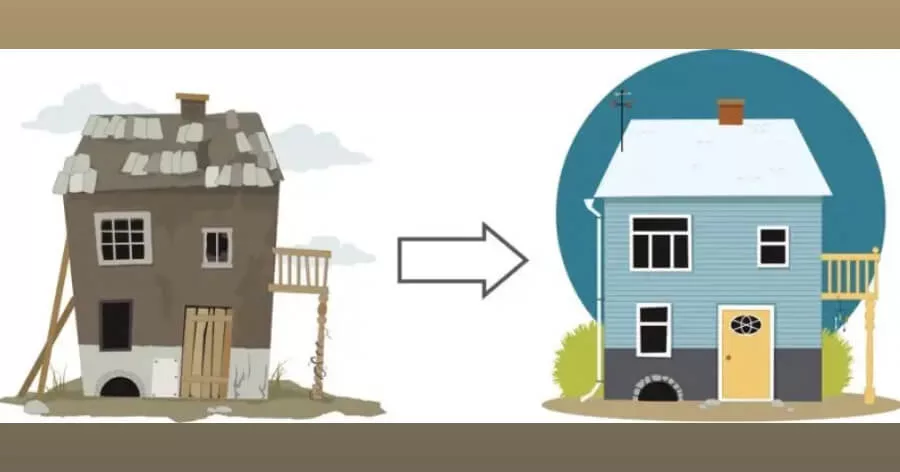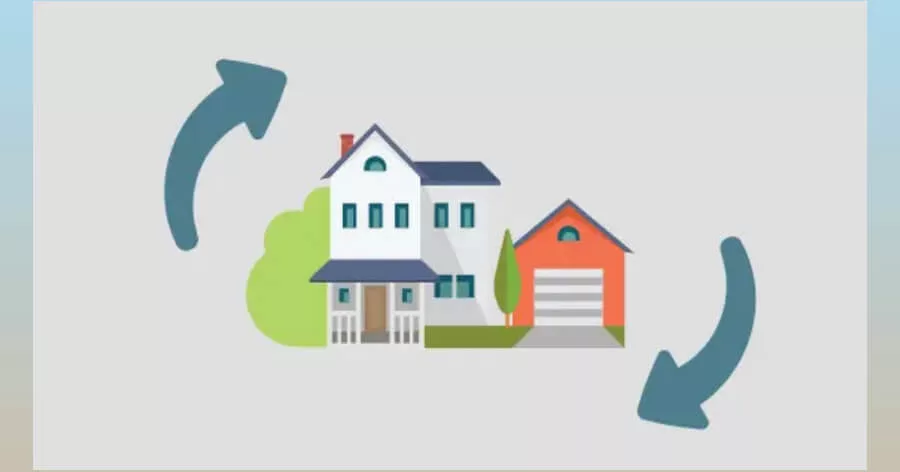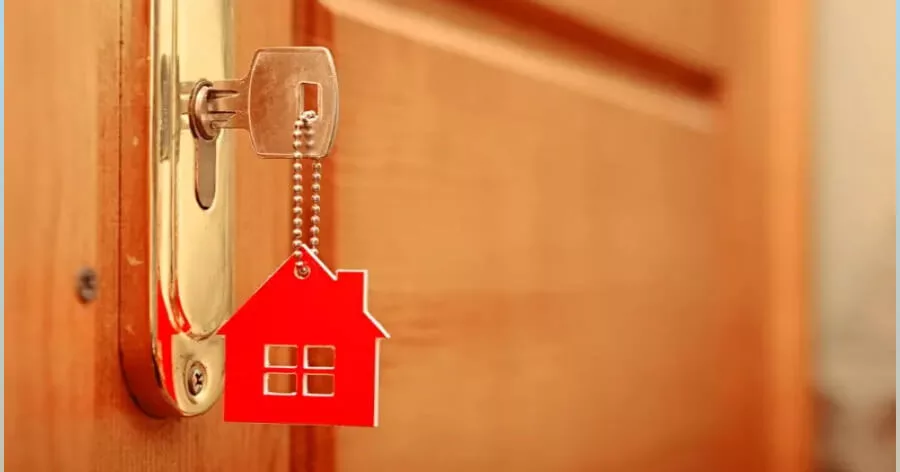A Step-By-Step Guide to Learn About House Flipping in 2023
House Flipping: Step-by-step guideline and Pros & Cons

House flipping is the practice of purchasing a home, holding onto it for a brief period of time, and then selling it for a profit. An investor uses the flipping approach to make rapid money by purchasing real estate at a discount and then making improvements to sell it for more money. You are purchasing a home as a real estate investment, not as a place to live. It is important to note that buying low and selling high is the primary objective or goal of flipping.
Flipping a house might involve holding onto a fixer-upper until you can sell it for more money than you paid for it, or it can involve you, the new, temporary owner, doing renovations to make it marketable. In either case, the objective is to purchase low and sell high in order to make a profit in a short period of time, typically within a few months or a year.
Pros and Cons of House Flipping
Some people genuinely take pleasure in upgrading a home themselves. But becoming a house flipper has additional benefits in addition to many risks.
Pros
Following are the pros of house flipping:
A Decent Profit
Making good profits quickly is one of the house flipping business’ most evident advantages. This is a successful industry for real estate agents, firms, and people who work in it full-time.
Not only may you benefit significantly from each transaction, but you can also keep running your business part-time to safeguard your financial future.

Can Be Used As a Part Or Full Time Job
Some people start flipping houses and eventually live there full-time, while others use it as a side job to supplement their income for holidays, savings, or retirement.
Diversify Your Investment Portfolio
Generally speaking, diversifying your investment portfolio is an excellent strategy to lower risk. One of the most common long-term investments outside of stocks and bonds is real estate: Property values typically rise in value over time and move in the opposite direction of equities markets. Diversifying your holdings by including real estate in your investing portfolio can assist, and flipping homes is a terrific way to make money off of those investments.
Growth In The Real Estate Sector
Gaining substantial experience in house flipping requires a significant investment of time and money. But it’s worth every bit of effort. When you consistently buy homes and supplies, you hone your crisis-management skills to assign time and duties and acquire strong negotiation skills.
As you learn to complete more transactions faster and make more money, personal development leads to professional progress. You have the chance to develop into a seasoned real estate investor by learning everything there is to know about the local market, popular construction trends, and the real estate sector. Additionally, you should work on expanding your network to get in touch with as many investors, contractors, and lawyers that are interested in purchasing flipped houses.

Cons
Following are the cons of house flipping:
Significant Issues in Houses
Home flippers frequently spend a significant amount of money repairing the homes they purchase, and if unanticipated problems with the property develop, their expenditures may end up being significantly more than projected. What if asbestos is discovered when you open things up? Mold? Termites? These are just a few of the many items you could discover during renovations.
There Might Be Legal Issues
There is always the possibility of lawsuits if you buy a house without a clear title or sell one that has problems you didn’t rectify or properly handle. Having a strong team looking out for your interests is crucial for this reason. Having the ideal team members in place includes having a fantastic real estate lawyer.
The House Might Not Sell Quickly
You are liable for any expenses associated with the property you are seeking to flip if it remains on the market, including the house payment (if you have financed it), property taxes, and homeowners insurance. Don’t forget about additional homeownership costs like maintenance. You should therefore have some money saved aside in case the flip is a failure.
A Lot of Pressure
The element of risk in house flipping might potentially result in financial loss and have a negative impact on your health. If you don’t have the correct team, mindset, and discipline in place, it may be emotionally exhausting and financially draining.
Step By Step Process of House Flipping
You’ll want to make sure your finances are in order and that you have the ideal properties in mind first because flipping homes isn’t something you can jump into quickly.

Set a Budget:
Lack of funding for your project is a significant financial strain. Pi advises you to multiply your present budget by five times instead of entering the situation cautiously. Whatever you believe to be sufficient is probably not. particularly if it’s your first time.
Make a list of any minor repairs as well as any pricey renovations, such as plumbing or electrical issues. A contractor can explain what needs fixing and how much it will cost if you don’t have experience in construction. Be sure to conduct your research in this area because unexpected repairs can make or break a flip.
Search For The Right Property:
If money is tight, seek for residences that best suit your present financial situation. Look through short sales, foreclosures, and auctions to determine which ones best suit your needs and capacity for renovation. Don’t be afraid to ask a real estate agent with experience working with house flippers for advice. This agent can assist you in locating locations and residences in which to invest your money wisely by researching comparable properties and price-growth forecasts.
Make an Offer:
You can submit an offer if the home you want to purchase and your finance are both in order. To estimate how much to bid, expert flippers frequently evaluate a home’s after-repair value. It’s ok if an offer is rejected; if one doesn’t work out, you can have other properties in mind.
Set a Timeframe:
Property renovations don’t all cost the same amount of money and don’t all take the same length of time. Give yourself enough time to complete the necessary modifications and repairs, whether it’s one month or six, and account for the time needed for building inspections (if needed).
Hire a Trusted Real Estate Agent:
Employ reputable contractors. You should engage reliable craftsmen to complete the essential work unless you have the skills to conduct repairs and renovations yourself. Some contractors, but not all, have complete teams to work on every part of the house. Verify a contractor’s license and references before hiring them, and make sure their prices fit your budget and timetable requirements.
Sell Your Property:
It’s time to list your home for sale after the updates have been done. While you may sell it on your own, a real estate agent can help you reach more people and advertise the house to the best purchasers.
3 Common Mistakes While Flipping Houses
Although there may be a profit to be made from flipping properties, you shouldn’t start without a lot of money, advice, and planning. Here are some pitfalls that house flippers should avoid if they want to be successful.
- Not Having Enough Money
Your project will define your budget, and not every property will require a remodel similar to one from a reality program. Complete renovations, clean-up-and-sell-as-is properties, or houses that only require minor repairs can all be listed for sale to attract the next investor.
Double your initial budget, then double it again, and finally put your initial budget on top of that. When you don’t know what you’re doing, everything adds up rapidly, and contractors take advantage if you’re a newbie.
- Not Having The Right Team
Working with seasoned, reputable and experienced people is safe. A real estate agent, construction or renovation business, home inspector, real estate attorney, and accountant to assist with tax preparation can all be part of your team, particularly if you intend to make house flipping into a business.
- Doing It As a Part-Time Job
Long-term attempt at doing it part-time. If you work a regular job, it might be more challenging to become a house flipper. Someone needs to be present if you’re working full-time and concerns arise on-site. It’s not a worthwhile side business. Do it full-time if you’re going to.

House Flipping Tips
- Budgeting can be easy if you’re going to purchase a new home. Similar to purchasing a property you actually intend to occupy, you will only have to pay for the house, taxes, real estate agent, and legal expenses. The supply of homes is significantly more than the demand in a softening market, so you might end up keeping the property longer than you intended.
- When you contemplate the repairs you’ll need to do on a fixer-upper, the budget starts to increase. The majority of experts agree that you should increase your final cost estimate by 20%. If you overestimate, you’ll receive a pleasant surprise; if you underestimate, you’ll be saddled with unforeseen expenses.
- The least glamorous but most crucial upgrades a flipper may do are structural ones, such as plumbing, wiring, insulation, pest control etc. A fresh coat of paint and new hardwood flooring could entice buyers. If you lack the necessary technical expertise, you will also need to account for the cost of labour.
- For the greatest return on your investment, the majority of real estate agents advise remodeling the kitchen and bathrooms. New cabinetry, counters, hardware, sinks, backsplashes, appliances, flooring, and lighting can be added to the structural alterations. Upgrades to the kitchen can be pricey, but they leave a lasting impact.
Conclusion
Get your finances in order before starting a house-flipping business. You can choose a variety of house loans, including construction loans, home equity loans, and home equity lines of credit, to finance investment properties. Personal loans are also an option for house improvements, but first compare the interest rates and terms to those of home loans.
Keep in mind that there is a significant chance of losing time, energy, and money. By maintaining a healthy emergency fund in the event of financial loss, you can save your future self. You might wish to start off that way since house-flipping wouldn’t make a nice side hustle. In case house flipping isn’t your genuine calling or if the real estate market goes against you, you’ll still have your day job’s income.
You can also invest in other famous and most in demand housing societies, such as , Blue World City, Rudn Enclave, 7 Wonders City Peshawar, Taj Residencia, Kingdom Valley, New Metro City Gujar Khan, Forest Town Rawalpindi, University Town Rawalpindi, ICHS Town, Park View City Islamabad, Multi Gardens B17 Islamabad and Nova City Islamabad.
Al Sadat Marketing please contact 0331 1110005 or visit https://alsadatmarketing.com/
Few more real estate housing schemes which are trending now a days in Islamabad by including: Faisal Town Phase 2, Prism Town Gujar Khan, New City Paradise, Eighteen Islamabad, 7 Wonders City Islamabad, Capital Smart City, Silver City Islamabad, The Life Residencia, Faisal Town Islamabad, Islamabad Golf City, Islamabad Model Town and Marble Arch Enclave.
Al Sadat Marketing is an emerging Real Estate Agency headquartered in Islamabad, Pakistan. With over 10+ Years of experience, Al Sadat Marketing is providing its services and dealing all trending housing societies projects in different cities of Pakistan. Islamabad Projects, Rawalpindi Projects, Gujar Khan Projects, Burhan Projects, and Peshawar Projects etc.
Book Your Plot Now: +92 331 111 0005








